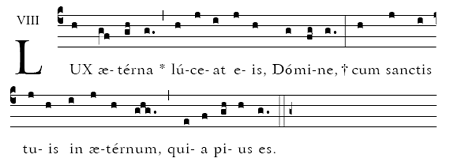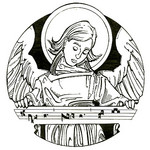“You would have been impressed by some of the young priests praying with him on his deathbed, singing Latin chants from memory! ….Fr. N.N. even sang part of the ‘Nos autem’ by heart….”
“As far as church music goes, he is one in ten million.”
“…had Mons. Schuler’s 10:00 Sunday High Mass been the one adopted by the universal Church after the Council it is unlikely there would have been such an urgent need for traditionalist counterrevolution.”
“…I will never forget the beauty of Holy Mass at St Agnes. He…and the liturgy he promoted so beautifully were major factors in the rebirth of my Catholic faith.”
“Palm Sunday 1992 was the first time I visited St Agnes church. I had been away from the church, in no small part due to the banality of liturgy — though I didn’t know there could be anything better. On a recommendation from a friend I visited the parish. I had never been to a Latin Mass. I had never heard a sung Mass. That day I felt like I was being introduced to my religion for the first time….That was my first Latin Mass. I returned for Holy Thursday and the Vigil before I had to return to college. I didn’t understand then the Latin of the Mass, but it was clear that the faith expressed in those liturgies was total, and I needed to be there. I’d had it with half-way Catholicism. At St Agnes the faith was on display gloriously. Here the faith seemed as ancient as it did strong and vibrant. And from that Holy Week I determined that I was going to learn and do my part to preserve the Gregorian melodies….”
“It was during a visit to St Agnes Church on an October weekend in 1993 that my life was changed forever. A weekend of Mons. Schuler’s wonderful hospitality was crowned by Holy Mass with the Mozart ‘Missa longa’ as the musical offering. The seeds for the N.N. Catholic Chorale were sown that day. By the grace of God we are now in our tenth year and still growing. Suffice it to say that there would be no N.N. Catholic Chorale without the inspiration, guidance and prayers of our beloved Mons. Schuler. He was of great courage and example in a bleak time. He was a good friend. May he rest in peace.”
“It was a great privilege to have met Mons. Schuler albeit only once. He kept the flame of the Sacred Liturgy alight in a very dark age indeed and passed that light on to many others to whom he was a father and a guide. May Almighty God reward this disciple of the true liturgical movement — this pioneer of the new liturgical movement! R.I.P.”
Even this small sampling of voices from the world wide web gives eloquent testimony to the enormous beneficial effects of Richard Schuler’s priestly life and work. And what (we ask) was the vital force which sustained that life and impelled those achievements?
Surely it was his firm and lively faith in God, in God’s Son become man, in the Church He established on the Rock of Peter. There can be little doubt that this is the key to understanding the four score and seven years of Mons. Schuler’s earthly sojourn.
It explains his path to the altar of God Who gave joy to his youth, his academic training and teaching career, his founding of the Twin Cities Catholic Chorale in 1956, his decades of notable collaboration in national and international church music organizations. That faith and loyalty to the Church and the Vicar of Christ also marked his pastoral efforts at St Agnes parish from 1969 until 2001. Those efforts were best described in his own words.
“In every way, what is done at Saint Agnes is in perfect accord with the directives of the Holy See and the reforms of the Second Vatican Council. Liturgy at Saint Agnes is not a home-made activity. Rather it is the action of the Church, which is the Mystical Christ; and therefore, the liturgy is the very action of the Redeemer Himself. Only the Church, the Mystical Christ, can determine what that is to be. It remains for the priest and the people to carry it out as the Church prescribes it with as much care, reverence and solemnity as possible. From the beginning of the parish this was the intention of the pastors, and nothing was spared to make the Eucharistic Sacrifice noble and beautiful, fully in accord with the ritual of the Roman Catholic Church.”
In these words lies Richard Schuler’s legacy, here his lesson for all who come after him.
How often have we heard it said that “no one is irreplaceable?” That claim may be true when it applies to certain positions in the life of men and society. But if the statement refers to the inner core of a person as an individual, to his originality and his personality – then ‘irreplaceable’ is a rather superficial word.
To the extent that every person is an unique creation of God, every person is in himself irreplaceable, because one of a kind. But for others, a man can be irreplaceable if during his life he was able to enrich others from the heart of his own personality, to form and shape and mould them. In that sense, for those of us who knew him well as fatherly friend and counselor, the late lamented Richard Schuler is indeed irreplaceable. For us, there will come situations in which we can no longer ask his advice because Richard Schuler has left us for a better place. Our sorrow is great because we no longer have him as a man, can no longer hear his voice or feel his friendly handshake, can no longer see his impressive priestly figure.
But he has built himself a monument in the hearts of those to whom he was priest, teacher, mentor and friend. His image should remain in our memories and in our hearts, so that he continues to influence and inspire us.
Together with the company of comrades from the American Society of St Caecilia (1956/64), the Consociatio Internationalis Musicae Sacrae, and the Church Music Association of America (1964 ff.), I say farewell to Richard Schuler with a word we so often exchanged after long evenings of conversation both serious and cheerful…on the Burgmauer or on Lafond Street, at Campo Santo Teutonico in the Vatican or at Fr Siegfried Reh’s hospitable rectory in Holzgau in the Lechtal: “I’ll see you in the morning!”
Yes, indeed, in the morning…in the morning when that Morning Star arises which knows no setting — He Who returning from the grave serenely shone forth upon mankind, bringing to you, old friend, and to all of us redemption and everlasting life !
+
ILLI CANENTES JUNGIMUR
ALMAE SIONIS AEMULI
+
HAVE PIA ANIMA !
Rev’d Prof. Dr. Robert A. Skeris
Chairman, Dom Mocquereau Fund
Director, Centre for Ward Method Studies
B. T. Rome School of Music
The Catholic University of America




